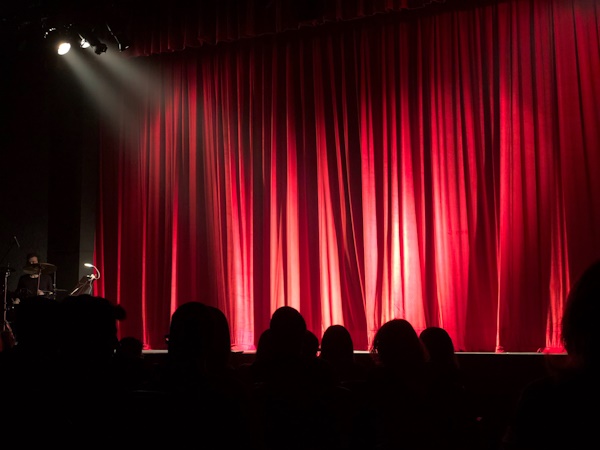- Κωδικός / Course Code: ΘΕΣΠ511
- ECTS: 15
- Τρόποι Αξιολόγησης / Assessment:
10% interactive educational activities, 30% written assignments and 60% final examination
- Διάρκεια Φοίτησης/ Length of Study: Εξαμηνιαία (χειμερινό) / Semi-annual (fall)
- Κόστος/ Tuition Fees: €425
- Επίπεδο Σπουδών/ Level: Μεταπτυχιακό/ Postgraduate
Module Purpose and Objectives
In this unit students gain a thorough and clear understanding of key theoretical concepts associated with the theatrical phenomenon, as well as of the main theoretical trends developed or applied in the area of theatrical creation and practice. Among others, elements of anthropology and semiotics of the theatre and of the stage area, elements of theatre phenomenology, as well as the poststructuralist and deconstructionist approaches to the theatrical phenomenon are being scrutinized. At the same time, this unit provides a succinct yet comprehensive introduction to the discipline of Theatre Studies (directing, acting, audience, dramatis personae, theatrical action etc.).
The main objectives of this Module are to enable students to:
- Understand the definition and research scope of Theatre as an academic discipline.
- Cite the basics of the special features of theatre (collective communication, actors, audience, the theatre as semiotic system).
- Know the structural parts of theatre (dramatic discourse, dialogic element, stage directions, acts, scenes, images, tableaux etc.) and the basic functions of theatrical language.
- Understand the main parameters of stage presentation (direction and director’s role, performance and performance theory, costumes, make-up, scenic design, set, stage lighting etc.)
- Know the essentials of the actor’s craft and acting techniques.
- Appreciate the role of the audience and the importance of a play’s reception; know the main components of relevant theoretical approaches.
- Know key components of scenography and stage decor.
- Make convincing and adequate analyses of dramatic characters in conjunction with the concepts of tragic hero, dramatic character and comic type, as well as with the problems of verisimilitude and
- Know the basic components of dramatic action (action and dramatic character, plot-episode etc.).
Module Content
1. The systematics of Theatre Science
- The discipline of Theatre Science
- Subdivisions of the theatrical phenomenon: verbal theatre/text-based theatre, music theatre, physical theatre, puppet and mask theatre, performance
- Brief introduction to the concept of postmodernism
2. Definition of the theatre
- Attempts to define theatricality (Evreinov, Kutscher, Fischer-Lichte, Münz etc.)
- Boundaries between theatricality and theatre
- Theatre in Education
- Theatre for special groups
- Interactive Theatre
- Community Theatre
- Business Theatre
- Theatre for development
3. Theories of theatricality
- Overview of theatre theories: Aristotle, mimesis, poiesis, catharsis, aesthesis.
- Sociological and communicative approaches to theatre (Goffman, Paul, Dahrendorf, Rapp, Burns, Gadamer etc.).
- Social and theatrical roles
- Sociological models of collective interaction
- Theatricality of society / theatre of life
- Theatre and play
- Semiotic approaches to theatre (Kowzan, Fischer-Lichte, Elam).
- Anthropological approaches to theatre, performance studies
- Phenomenological approaches to theatre
- Psychological / psychoanalytical and feminist approaches to theatre
- Economic approaches (cultural materialism)
4.Theatrical performance as special form of communication
- Communication systems implicit in the theatrical performance
- Role and actor: (a) brief overview of the history of acting and relevant approaches, (b) acting methods of the 20th (Stanislavski, Brecht, Copeau, Meyerhold, Grotowski, Strasberg, Michael Chekhov etc.)
- Role of spectator and audience: psychological, empirical/sociological, semiotic and esthetic receptions of a performance
- Quantitative and qualitative methods for assessing audience response
- Theatre space and theatre time: typologies of stage arrangement (monotopic and polytopic stage, simultaneity/succession of scenes, environmental theatre), types of theatre time (dramatic time, stage time, real time)
- Performance analysis: methods, groups of sources, questionnaires, approaches.
5. Performance
- Performance-doing or performance-action
- Social/anthropological range of a performance
- Relation between life-performance and theatre-performance
- Reading performance
- Performance and identity
6. Dramatic text
- Types of text
- Playwrights and writers of plays
- Play within a play
- Dramatic structures
- Devising a play
7. Dramatic forms
- Tragedy, comedy, tragicomedy
- Epic theatre/drama
- Documentary and agitprop
- Farce
- Melodrama
- The well-made play
- Dramatic form deconstructed
8. Acting: the body in space
- Costumes
- The paradox of acting
- Realism in acting
- Psychological gesture
- Creativity and tradition
- Alienation
- Street scene
- Acting in the “holy theatre”
- The mastery of movement
- Speaking a text
- Directing
- Overview of the history of directing
- The great directors
- The contemporary director
- Stage director and film director
- First tasks
- Before rehearsals
- Rehearsals
- The last lap before the premiere
- Theatre architecture
- Total theatres
- Stage design
- On stage
- LX-stage lighting
- Running the show




